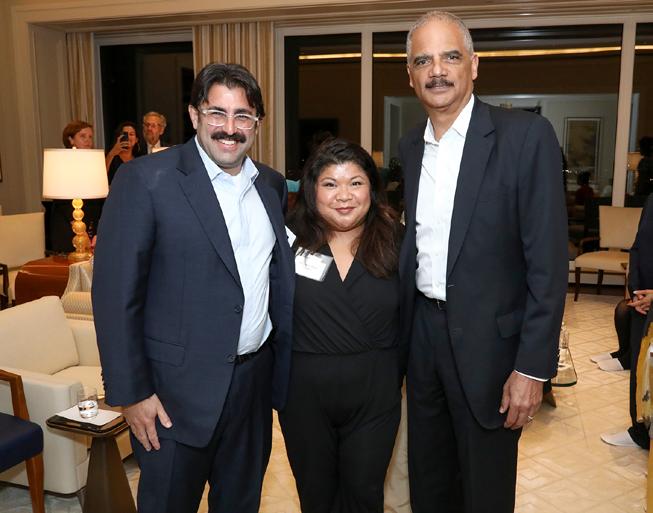2022 Impact Report

January 2023

Letter from the Executive Director and Co-Founder

2022 was a transformational year for Public Wise.
It was a year when our impact was resoundingly reflected through earned media, collaboration with movement partners, and a palpable shift in the electorate’s motivation to keep white supremacists out of office.

We launched the groundbreaking Insurrection Index, gave nearly $3 million to partner organizations, organized funders, hosted events with and for partners, and established the Public Wise PAC.
We hired additional research, political, digital, and partnerships staff, supported more than 50 organizations, and most importantly kept insurrectionists out of office.
I am proud to lead this organization, and am excited to continue growing in 2023. I hope you will read the following highlights from 2022 and be as inspired by this work as I am.
 Christina Baal-Owens Executive Director Public Wise
Christina Baal-Owens Executive Director Public Wise

Public Wise Board of Directors
Eric Laufer Board Chair
 Andy Bernstein Executive Director, HeadCount
Jacob Faber, PhD Associate Professor of Sociology and Public Service, NYU
Andy Bernstein Executive Director, HeadCount
Jacob Faber, PhD Associate Professor of Sociology and Public Service, NYU

 Kristen Dart Political Director, Planned Parenthood, Empire State Acts
Kristen Dart Political Director, Planned Parenthood, Empire State Acts
Shijuade
Kadree Director of Diversity Strategy, Snapchat

 Stephanie Miliano Chief of Staff, Stu Loeser & Co
Stephanie Miliano Chief of Staff, Stu Loeser & Co
 GOTV with Asian American Advocacy Fund
Meet & Greet with President Barack Obama
Drag Out the Vote Fundraising Event
GOTV with Asian American Advocacy Fund
Meet & Greet with President Barack Obama
Drag Out the Vote Fundraising Event












3 Table of Contents Research Department 4 The Unheard Third & Non Voters 5 SCOTUS Poll 6 Public Opinion on January 6, 2021 6 Youth Voter Survey 8 Public Wise Political Action Committee 10 Coordinated PAC Efforts 10 Non-Coordinated PAC/Independent Expenditure Efforts 11 Partnerships 12 Priority State Breakdown 13 Special Projects 14 Insurrection Index 14 America Votes Summit Welcome Reception 15 When We All Vote Culture of Democracy Summmit 15 Funds+ 16 Donor Cultivation 19 Communications 20
Meet the Team
Katelyn Israelski Chief of Staff Eli Szenes-Strauss Political Director Jessie Kalbfeld, PhD Research Director
Maria Javier Chief Information Officer
Gabriela Rivera Deputy Political Director
Sara Moore, PhD Deputy Research Director
Jessica Hall Operations Director Emilomo Mwendapole Senior Content and Brand Manager
Ella Wind, PhD Senior Research Associate Carolyn Reyes, PhD Senior Research Associate
Christina Baal-Owens Co-Founder Executive Director
Mark Cruz Data Steward
The Public Wise Research and Education Fund had a busy and productive year in 2022.

Our four person research team produced a wide array of work this year.
7
4 PhDs in-house Research projects Surveys Research Reports

5 4 1 23 1
Blog Posts
White Paper
Webinar
4
The Unheard Third & Non Voters
In the first half of 2022, the Research Department continued the work we started in 2021 on people who were eligible to vote in 2020 but chose to sit out the presidential election.
We expanded on our Unheard Third series, publishing posts written for the general public on our website. We wrote a piece challenging popular narratives that characterize people who do not vote as apathetic. In this piece, we detailed reasons why people might choose not to vote, despite being eligible and largely able to cast their ballots.

We also introduced key themes from our Non Voter Report, which we published on the Public Wise website in June 2022 and disseminated to our partner organizations.
The report was written based on our analysis of transcripts from 23 focus groups with 148 Americans who were eligible to vote but who did not cast a ballot in the 2020 presidential election.
We found that despite the commonly held belief that nonvoters do not care, in fact many of them do care but are disillusioned by our electoral system and the lack of trust, transparency, and accountability they see in our government.
They choose not to vote because they do not see any concrete effects in their daily lives from doing so.
5
SCOTUS Poll
In February 2022, the Research Department wrote a survey, fielded by Change Research, to investigate public opinion on President Biden’s shortlist of candidates to fill the Supreme Court Vacancy and to test the extent to which question framing changes the results of a survey.
We had noticed that many other polls about Biden’s decision to nominate a Black woman to fill Justice Breyer’s seat on the Court framed their questions in ways that were likely to skew the responses in one way or another.

In response to this observation, we wrote a short survey that included four questions about Biden’s decision, each framed in different ways. We then asked Change Research to randomly divide the sample among the four questions so that each respondent only saw one of the four.
What we found was that the public was generally in favor of Biden nominating a Black woman to the Supreme Court when the decision was framed as a way to increase the diversity of the court and when it was framed as Biden keeping his campaign promises.
Public Opinion on January 6, 2021
Also in February 2022, we continued our research on public opinion on the events of January 6, 2021. We fielded a national survey to follow up on our first survey that was conducted in October 2021.
In this iteration, we repeated many of the same questions but also added a section on belief in conspiracy theories and one to measure Christian nationalist and ethnonationalist ideas.
We were curious to see to what extent certain conspiracy theories were related to not wanting accountability for the participants in January 6th.
We also wanted to explore the hypothesis that support for January 6th was related to Christian nationalism, a hypothesis that has been
On the other hand, the public was generally not in favor when it was framed as either a set aside or trying to fill a quota. The results of our survey demonstrated that framing matters and public opinion on the same issue can look radically different depending on how a question is asked.
We released a topline report on the results of our survey on the Public Wise website as well as a press release highlighting our findings.
discussed by other researchers in the field of political science. This survey was fielded by Change Research.
We found that Americans still largely agreed that it is important to hold the participants in January 6th who broke the law accountable for their actions.
The group most split on the question of accountability were those Americans who self-describe as conservative. We found that among conservatives, the best predictor of thinking accountability was not important was a belief that voting machines changed votes from Trump to Biden and a belief that accepting diversity is not important to being an American.
6
Interestingly, Christian nationalism was not a good predictor of views on accountability and was pretty evenly distributed across conservative Americans.
From these data, we produced a topline report that detailed all the findings, a white paper that focused specifically on what explained conservative views of accountability, and a five part blog series that broke down the findings from the white paper in a way that would be accessible to the general public.
We followed up on our two national surveys on January 6th with a survey of registered voters in battleground states in August ahead of the midterm elections.
We surveyed registered voters in Arizona, Georgia, Michigan, North Carolina, Ohio, and Pennsylvania. For this iteration, we took out most of the questions about conspiracy theories, added to our questions on ethnonationalism, and included a redesigned set of questions about media consumption to get a better sense of where people are getting their information.
We found that in battleground states, the majority of registered voters think it is important to hold participants accountable but as in our previous work this was stratified by party and ideology. We also found that a majority of registered voters paid attention to the Congressional hearings on January 6th and views on the credibility of the information coming out of that investigation were highly polarized.
Most registered voters in these states were highly motivated to vote in August, especially those who reported paying “a lot” of attention to the January 6th hearings.
From these findings, we put out a topline report that documented the overall findings and separate topline and analytic reports on media consumption and how that related to views on accountability.
In these reports, we document our findings that Democrats and progressive/liberal Independents were more likely to trust the news media in general and to trust their chosen news sources in particular than moderate and conservative Independents and Republicans.
We found that TV is the most common source of news, followed by social media. We also found that TV news consumers were more likely to report paying a lot of attention to the January 6th committee, but newspaper consumers were more likely to find the January 6th committee hearings to be “very credible” and to report that they strongly support the committee.
In addition to these two reports, our team is currently working on a report looking at the relationship between anti-semitism, anti-Black, and anti–immigrant sentiments and opinions on January 6th accountability and belief in great replacement theory among registered voters in battleground states.

7
Youth Voter Survey

In collaboration with Public Wise partner HeadCount, we conducted a study on youth voters. We were interested to understand where young people stand on certain issues ahead of the midterms, their civic engagement activities, their civic knowledge, and to test several GOTV message frames.
We fielded this survey with Change Research in May to a nationally representative sample of 18-29 year olds. We found that the number one issue that was top of mind for young people ahead of the midterms was abortion/women’s rights/bodily autonomy. The other two most cited top issues were the economy/cost of living/inflation and the environment/climate change.

We found that young people are quite civically engaged with most of their engagement coming in the form of expressing political opinions online. We also found that 51% of young people said they had contacted an elected official sometime in the past five years. Young people were generally knowledgeable about some basics of our electoral system but their open ended responses to the question “what are the midterms?” demonstrated that there is a lot of room for improvement in civic education.
We also found that the most effective GOTV message frame among young potential voters was one that framed voting as a way to hold elected officials accountable.
From these findings we wrote a comprehensive Youth Voter Report that was published on the Public Wise website and shared with partners and other stakeholders in the democracy space. We also held a well attended webinar to go through our findings and give our messaging recommendations. Following our briefing, partner organizations such as Generation Vote used the research to create messaging guides for their youth voter outreach programming.
8
Coming Soon
In 2022, we also continued an ongoing study of the relationship between trust in democracy and voting behavior. This is a panel study, which we hope to continue for years into the future.
This project uses the AmeriSpeak panel from NORC at the University of Chicago. Because it uses a panel, we can ask questions of the same people year after year and track changes in their opinions.
NORC also performs voter validation by checking respondents in the voter file to record which respondents voted in the election.
Our research plan involves fielding each wave in October ahead of an election and asking questions about trust in democracy and intentions to vote and then comparing that with actual voting behavior.
We fielded the first wave October-November 2021. We fielded the second wave October 3-November 3, 2022. We expect voter validation data in early 2023, at which point we can put out our first report tracking any change in respondents attitudes and behavior from 2021 to 2022.
Additional Research Notes
We also provided assistance to Public Wise’s efforts in Ohio’s 9th Congressional District. Through the organization’s 501(c)(4) entity, we revised poll questions written by Change Research, prepared the data, conducted statistical analyses, wrote a memo, and created data visualization for Public Wise and Public Wise partners. This was part of the political department’s efforts in Ohio in support of one of our endorsed candidates.
In addition to our research projects, we also produced several explainers for the Public Wise website to make topics related to democracy more accessible to our partners and the general public.
We are finishing out the year working on a continuing project in collaboration with Public Wise Board Member, Dr. Jacob Faber.
This project uses data from the Insurrection Index, along with data from multiple publicly available data sources. We plan to evaluate the differences between districts represented by congress people who participated in the January 6th insurrection in some way and districts represented by people who did not participate.
We have completed extensive coding and cleaning to create a comprehensive dataset that we plan to make available to the general public. Early in 2023, we will move forward with our analysis and write a manuscript for submission to a peer-reviewed academic journal.
We produced two pieces for Black History Month describing the state of voting rights for Black Americans before and after the Voting Right Act was passed.
We also published a three-part series on gerrymandering. The first piece explained what gerrymandering is. The second part focused on the impacts of gerrymandering. The third described the state of redistricting after the 2021 redistricting process.
Finally, we also published an explainer on what to pay attention to when reading polls along with an editorial on how polling works, the limitations of political polling, and why polling shouldn’t be the only piece of data we pay attention to during election cycles.
9
Public Wise PAC launched in 2022 with both coordinated and non-coordinated sides of the PAC doing incredible work.

This was the first year Public Wise endorsed candidates.
6 Endorsed Candidates
5 Candidates Elected
Coordinated PAC Efforts
We gave $20,000 in support to pro-democracy candidates and aligned committees in 2022.
We also hosted an AAPI Fundraiser for Bee Nguyen led by Ai Jen Poo and sent fundraising emails for Josh Shapiro and Bee Nguyen.
Jocelyn Benson Elected

Michigan Secretary of State


Marcy Kaptur Elected

United States Representative Ohio 9th Congressional District Bee Nguyen Not Elected

Georgia Secretary of State
Josh Shapiro Elected

Pennsylvania Governor
Izzy Smith-Wade-El Elected

Pennsylvania House of Representatives District 49




Adrian Fontes Elected
Arizona Secretary of State

10
Non-Coordinated PAC/Independent Expenditure Efforts
Ohio

In Ohio, we gave Black Ohio Leaders for Democracy (BOLD) a grant which allowed their 501(c)(4) organization to run a field program of 10-15 volunteers. The volunteers were onboarded and trained by Public Wise’s staff and the Executive Director of BOLD. During the three months leading up to the elections their field team was able to complete 34,083 phone calls and send 109,352 text messages to constituents in Ohio’s 9th Congressional District.
In addition to the field program we aired a 30 second ad that called J.R. Majewski a “dangerous liar.” The ad had a total of 6.7 million impressions.
Arizona
We were able to support Mi Familia Vota this election cycle, giving them the opportunity to have a televised conversation with Adrian Fontes, Mark Finchem and the news anchors at Univision.
This event was the only televised Spanish language conversation between two statewide candidates in Arizona. There were a total of 805,320 TV impressions. The recording was also posted on the Univision Facebook page which generated an additional 9,872 social media impressions.
Pennsylvania

Our support of Mi Familia Vota in Pennsylvania led to the launch of a campaign video called, “#BastaMastriano,” which was posted on their webpage, TV, radio and social media platforms. The video content capitalized on a pun on the Spanish word “más” (meaning more) in Más-Triano. It highlighted his more extreme and more conservative positions.
The video campaign had ads run on TV and Radio that garnered a total of 637,160 impressions (Univision 187,500; Telemundo 161,820; WHAT-AM/FM 179,760; WGLD-AM/FM 56,000, and WTKZ-AM/FM 52,080 impressions).
On Instagram the video had a total of 217 impressions, 234 views, 5 likes, and 2 shares. On Twitter the first tweet had a total of 21,647 impressions, 4,564 views, 46 likes, and 37 retweets, and 416 engagements. The second tweet had a total of 261 impressions,1 like and 3 engagements (Twitter Link). The third tweet had 525 impressions, 4 likes, 3 retweets, and 18 engagements (Twitter Link). The fourth tweet has a total of 382 impressions, 4 likes, 6 retweets and 23 engagements (Twitter Link). On TikTok the video had an average watch time of 21.7seconds, had 99 views, 16 likes, and 1 share.
Having a Spanish-language telecast was a crucial tactic to mobilize the Latinx electorate because it provided members of the Spanish speaking community with a better understanding of the important role that the Secretary of State plays in every election.
We also supported efforts led by CHISPA Arizona this election cycle. They used funding to run a layered turnout program that included field and mail components to focus on statewide races such as Secretary of State.
Their program targeted a turnout universe with both persuasion and GOTV components with special emphasis on “Likely Latino Voters.”
In the end, CHISPA successfully knocked on a grand total of 250,951 doors in various counties throughout Arizona, including 145,813 in Maricopa; 64,768 in Pima, and 40,370 in Yuma.

11
Partnerships + Grants 2022 Overview
2022 was the first year we used our new granting system. We created metrics to ensure we meet priority issue areas and locations. We also launched the grants vote, democratizing our grants process by involving every staff member in voting on grant distributions.


$2,772,000 funds distributed
$340,000 for our partners from aligned donors for work in Arizona, Georgia, Pennsylvania, and in veteran communities









52 funded partners


100% BIPOC serving organizations
86% BIPOC-led organizations




12
Priority State Breakdown










































13
Arizona $670,500 Georgia $325,000 including $200,000 for runoff elections Ohio $250,000 specifically in Ohio’s 9th Congressional District Michigan $170,000 North Carolina $207,000 Pennsylvania $125,000
Special Projects Insurrection
Index
On January 6, 2022, we launched our Insurrection Index, to hold insurrectionists involved in January 6, 2022 accountable. The Insurrection Index is an online, public database documenting individual and organizational involvement in the insurrection on January 6, 2021.

The database is designed to be used by voters, local, state and national organizations and media outlets to track if and how a political candidate, official or person in a position of public trust contributed to the attempted coup on January 6, 2021. It is searchable by location, name, affiliation and social media handles.
The tool was built using social media, the dark web, press, court dockets, campaign finance information, FEC information, tracking the Donald.Win and Patriot.Win networks, FOIA requests and public statements.
Insurrection Index partners include Democracy Docket, Accountable.US, Advance Democracy Inc, American Oversight, Campaign for Accountability, Media Matters Action Network, Tech Transparency Project, and Elias Law Group.

Since our launch we have had over 161,000 unique visitors to the website and have increased the database of individuals by 50%. We added Donations Against Democracy, tracking corporate and PAC spending to insurrectionist candidates, all while maintaining a quick turnaround time for updating case files for arrested and charged individuals and election results from primaries and general election for media and press readouts.
Additionally, Gutsy Media produced an explainer video of the Insurrection Index, along with a 30 second version.
The Insurrection Index has been used as a tool by the House Select Committee to Investive January 6th, reporters, partner organizations and stakeholders working on threats to democracy and improving democracy-access, and voters.
We continue to update this database on a regular basis and hope it will continue to serve as a resource for voters.
14
America Votes Summit Welcome Reception
Public Wise hosted the America Votes Welcome Reception in DC with 250 guests from voting rights organizations across the country.
This event also featured remarks from Congressman Mondaire Jones and Congressman-Elect Greg Casar.
When We All Vote Culture of Democracy Summmit
Public Wise presented our research on public opinion on January 6th at the inaugural When We All Vote Culture of Democracy Summit, hosted by former first lady Michelle Obama.

This event was attended by voting rights advocates, students, stakeholders, and media influencers, and live streamed online for a wider audience.




15
Funds+
Drag Out the Vote
Public Wise hosted a joint event with partner organization Drag Out The Vote in NYC with 75 guests to bring attention to the organizing efforts in the LGBTQIA+ communities and to fight back against efforts to suppress queer voices.
The event included performances by Drag Out The Vote’s drag ambassadors, remarks from both organizations’ leadership, and Congressman-Elect Greg Casar.

This event garnered press attention by the Washington Post.

16
OH-9 JR Majewski Ad
With the help of the team at Blue State, we created and placed a 30-second digital ad in the Toledo and Columbus, Ohio markets to urge voters to keep known insurrectionist JR Majeski out of office.

This ad had 6,689,082 total impressions, with 3,227,443 on YouTube alone. Additionally, 823,810 YouTube users watched the video in its entirety.
One Pennsylvania
Public Wise successfully pitched and secured funding for One Pennsylvania for a 501(c)(3) voting education ad, totaling $40,000 in ad creation and placement by Gutsy Media.
This ad also focused on freedoms under attack as a GOTV message.

17
GOTV Assistance
During the General Election, our Executive Director traveled to Arizona to help get out the vote alongside many Public Wise partner organizations.



During the Georgia Run-Offs, our Executive Director and Deputy Political Director assisted in GOTV in AAPI and Latinx communities.
Election Night Parties
Public Wise provided micro-grants this year to support youth led election night parties in North Carolina with North Carolina Asian Americans Together, in Arizona with Poder in Action, and in Michigan with Michigan Liberation and Detroit Action.


18
Donor Cultivation
Public Wise hosted our first donor cultivation event in 2022, headlined by former US Attorney General Eric Holder. We will host additional donor cultivation events in 2023.


19
Our work garnered attention by the Associated Press, CNN, CNN International, PBS’s Amanpour & Co, The Guardian, The Washington Post, The Daily Beast, Talking Points Memo, CBS-ABN News, and more.


Wise Wednesdays
Finally, this year, we launched a newsletter program for partners and stakeholders, as well as an email program for donors, with nearly 3,000 subscribers. Please sign up to receive our emails here!

20
Press Highlights
Communications
Follow on Social Media instagram.com/publicwise facebook.com/publicwise linkedin.com/company/public-wise





 Christina Baal-Owens Executive Director Public Wise
Christina Baal-Owens Executive Director Public Wise

 Andy Bernstein Executive Director, HeadCount
Jacob Faber, PhD Associate Professor of Sociology and Public Service, NYU
Andy Bernstein Executive Director, HeadCount
Jacob Faber, PhD Associate Professor of Sociology and Public Service, NYU

 Kristen Dart Political Director, Planned Parenthood, Empire State Acts
Kristen Dart Political Director, Planned Parenthood, Empire State Acts

 Stephanie Miliano Chief of Staff, Stu Loeser & Co
Stephanie Miliano Chief of Staff, Stu Loeser & Co
 GOTV with Asian American Advocacy Fund
Meet & Greet with President Barack Obama
Drag Out the Vote Fundraising Event
GOTV with Asian American Advocacy Fund
Meet & Greet with President Barack Obama
Drag Out the Vote Fundraising Event












































































































